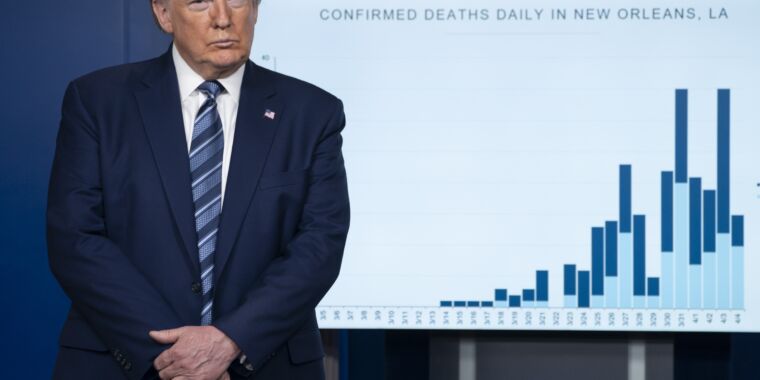Airing Trump’s false statements won’t get TV stations in trouble with FCC
The Federal Communications Commission has rejected a request to investigate TV stations' handling of President Donald Trump's coronavirus press conferences.
Advocacy group Free Press' emergency petition asking the FCC to investigate said that TV broadcasters' "context-less coverage of President Donald Trump's press conferences and other statements" may violate the broadcast-hoax rule. Denying the petition today, the FCC said that Free Press "misconstrues the Commission's rules and seeks remedies that would dangerously curtail the freedom of the press embodied in the First Amendment."
Free Press' petition said that "broadcasters are prohibited from knowingly airing false information about a catastrophe that causes 'substantial public harm.'" Under FCC guidelines, broadcasters can avoid violating the hoax rule by including a disclaimer that "clearly characterizes the program as a fiction and is presented in a way that is reasonable under the circumstances."
Free Press argues that broadcasters violated this rule by airing various Trump statements about the coronavirus without disclaimers:
Yet it appears myriad radio and television broadcasters across the country have been airing false and misleading information about coronavirus and COVID-19, a clear public health catastrophe, without the necessary context or disclaimers suggested by the broadcast hoax rule. Of particular and urgent concern is the deadly disinformation broadcast on television stations across the country in the form of context-less coverage of President Donald Trump's press conferences and other statements.
Trump's "mischaracterization of the efficacy of chloroquine phosphate is an acute example," Free Press argued. "Broadcast of that statement led to a nation-wide shortage of a drug integral to treating other ailments—exacerbating this health crisis. It also precipitated the death of an Arizona man and hospitalization of his wife... when they ingested the drug because they said they had 'watched televised briefings during which President Trump talked about the potential benefits of chloroquine' and believed it was safe because 'it was all over TV.'" (The couple ingested a chloroquine phosphate product that is used to treat disease in aquarium fish.)
Free Press further argued that "Wide broadcast of other of the president's false statements have also contributed to the cavalier attitude some have taken toward containing coronavirus and mitigating its spread." Those false statements, Free Press said, include Trump saying that "Anybody that wants a test can get a test," that the United States has "tremendous control" of the coronavirus, and that the virus is "going to disappear. One day—it's like a miracle—it will disappear."
"The FCC possesses both the authority and the responsibility to ensure the public airwaves are utilized in the public interest. This duty is heightened in times of crisis," Free Press said.
Free Press also said the FCC should investigate radio personalities who have "made misleading statements over the public airwaves, downplaying the threat, often echoing the president's inaccurate information." As examples, the group pointed to statements such as Rush Limbaugh saying "the coronavirus is the common cold, folks."
FCC not “arbiter of truth in journalism”
In explaining why it won't investigate broadcasters, the FCC said Free Press is demanding that the commission "impose significant burdens on broadcasters that are attempting to cover a rapidly evolving international pandemic in real time and punish those that, in its view, have been insufficiently critical of statements made by the President and others."
On whether TV stations should have to correct Trump's COVID-19 statements, the FCC said:
With respect to Free Press's proposal that we issue enforcement guidance or a policy statement recommending that broadcasters post prominent disclaimers when the President and others address the pandemic, we believe that such proposals are inconsistent with the First Amendment. Requiring such disclosures would constitute compelled speech, and "recommending" such disclosures through enforcement guidance or a policy statement would constitute government coercion by another name.
The FCC said that it is not "a self-appointed, free-roving arbiter of truth in journalism" and pointed out that even "false speech enjoys some First Amendment protection, and section 326 of the Communications Act, reflecting First Amendment values, prohibits the Commission from interfering with freedom of the press or censoring broadcast communications."
Airing Trump press conferences about the pandemic "does not amount to airing an intentional or knowing falsehood," the FCC also said. It is not "reasonably foreseeable that a broadcaster's decision to air [Trump's] statement [about hydroxychloroquine and azithromycin] would result in viewers or listeners ingesting cleaning products as a preventative measure to protect themselves from COVID-19," the FCC said.
"At best, the Petition rests on a fundamental misunderstanding of the Commission's limited role in regulating broadcast journalism," the FCC said. "And at worst, the Petition is a brazen attempt to pressure broadcasters to squelch their coverage of a President that Free Press dislikes and silence other commentators with whom Free Press disagrees."
The FCC's denial of Free Press' petition was not a surprise. On Twitter last week, Republican FCC Commissioner Brendan Carr called the Free Press petition "a sweeping and dangerous attempt by the left to weaponize the FCC against conservative broadcasters and politicians."
In response to Carr, Free Press stood by its petition, describing it as part of "a growing chorus of journalists, medical professionals, activists and journalism professors who are concerned that the broadcast of disinformation about the virus has discouraged people from taking appropriate preventative measures, and that it is endangering the lives of hundreds of thousands of people."
FCC Chairman Ajit Pai dismissed Free Press' concerns, saying the commission will "leave it to broadcasters to determine for themselves how to cover this national emergency, including live events involving our nation's leaders."








Gloss